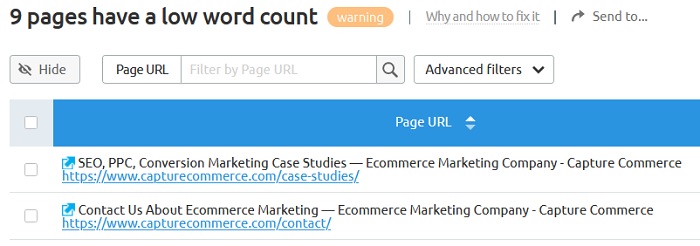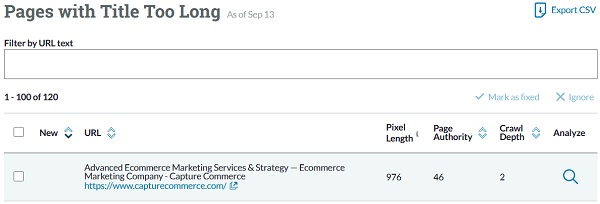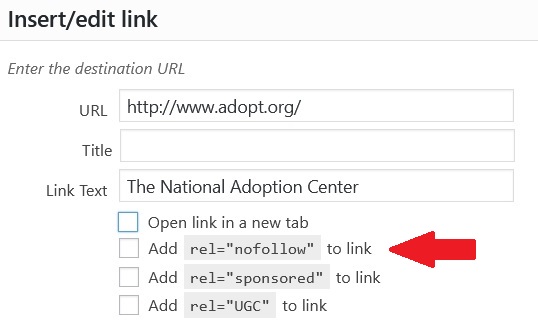Last updated on November 12th, 2020 at 10:41 pm
Perhaps you’ll agree with me when I say:
SEO audit tools save time and money by helping digital marketers quickly assess technical problem areas on a site so they can be repaired and get on to more important things.
Or do they?

Well, it depends because sometimes these SEO analysis tools callout “issues” that do not help and can actually hurt Google rank.
And in today’s post, I’m going to zero in on defunct and distorted SEO tool recommendations.
I have used the website analysis tools I mention here; they have been around for years, are respected by SEOs and provide value, but more and more people who use them do not seem to have enough SEO experience to recognize some of the outdated or poor advice.
But the damage can go deeper when their crummy guidelines are adopted as “the way” Google’s algorithm ranks pages today.
The Google ranking myth laced callouts:
- Low word count
- Too much text within the title tags
- Use at least one of your keywords in the URL
- The page content isn’t fresh
- Your mobile page does not have an AMP version
- Use nofollow links on external links
Low word count
(SEMrush, Ahrefs, Moz)
This callout by SEMrush flags any page with less than 200 words; Moz calls it pages with thin content.

SEMrush explains when you click “Why and how to fix it”:
“Search engines prefer to provide as much information to users as possible, so pages with longer content tend to be placed higher in search results, as opposed to those with lower word counts.”
This warning was probably intended for short blog posts and landing pages to prevent Google’s Panda algorithm from knocking them down due to “thin content,” which might be useful if the other signals that Panda evaluates are accounted for as well.
But when I look at some of the flagged URLs that shouldn’t be in this list I see contact pages, member login pages and interactive pages.

Do I really want more than 200 words on my contact page? Hmm, seems like it depends on the purpose of the page and SEMrush, Moz and other analysis tools seem to have no clue.
Over the years different studies have been done to learn what Google tends to rank higher, pages with short form content or long form content. Most of these studies show that longer content tends to rank higher.
John Mueller of Google:
Word count is not a ranking factor
John Mueller
Some pages have a lot of words that say nothing.
John Mueller
Why would a search engine use word count as a metric?
— 🍌 John 🍌 (@JohnMu) August 31, 2020
Barry Schwartz of Search Engine Roundtable says Google has answered this question many, many times, and it just won’t end.
So short form content can rank as high as long form content. But, if you have long form content that is original and well organized, it’s likely that it will rank for more keywords.
What Google has also been saying for many years (since Matt Cutts) is to prepare content for your users, not for search engines. That’s why word count is one of those “it depends” issues.
It depends on the intent of the searcher, it depends on what most people expect for the keyword, it depends on what types of content Google is ranking for the keyword, etc.
And that is the point that somehow SEMrush and other SEO tools are still missing with their “low word count” warning.
So, how do I evaluate content quality?
Yes, I get that question… a topic for another time.
Let’s keep moving.
Too much text within the title tags
(SEMrush, Web CEO, Serpstat, WebSite Auditor, All in One SEO Pack, Yoast SEO, Ahrefs, Moz, Screaming Frog)

SEMrush explains:
“Most search engines truncate titles containing more than 70 characters.”

Web CEO says:
“Shorten the title tags of X site pages to 70 characters (including spaces), because longer titles will be cut off on the search results pages.”

How long should my pages description meta tag or title tag be?
Well there is no fixed length. Make them unique, compelling and useful. Provide the information that people are looking for so that we can highlight your pages optimally.
John Mueller
Source: Search Engine Roundtable
Most SEO audit tools flag this one and I always ignore it.
Although there are no character limits to the title tag, Google will only show 600 pixels wide in the search results.
Just because Google cuts off visibility of the title tag (presumably to display it on one line for desktop browsers), does not mean that Google is not indexing the full title tag.
It’s unclear exactly how many characters of a title tag Google will index, some tests have shown up to 200 characters are indexed.
In my experience, the only proof that a title tag over 70 characters prevents it from ranking high is when it is keyword stuffed. If well written the page can rank for even more keywords when the title tag is “unique, compelling and useful” to quote Mueller.
It seems that SEO audit tools flag this because it goes against their “best practices” but it infers that if your title tag goes over their limit, Google just won’t rank the page as high.
That inference is false, but SEMrush, Web CEO, Moz, Ahrefs, Serpstat and the rest keep beating that drum.
Use at least one of your keywords in the URL


The SEO effect of keywords in the URL is minimal once the content is indexed. Make URLs that work for your users, not for SEO. Also, changing URLs on an existing site is a site-migration & it will take time/fluctuations to be reprocessed, so I’d avoid that unless it’s critical.
— 🍌 John 🍌 (@JohnMu) August 19, 2020
For more see Search Engine Roundtable’s post: Google Says Keywords In URLS Have Minimal Impact After Content Is Indexed.
So, is the URL already indexed by Google?
If the URL has not been indexed, then yes, add that keyword, especially if it makes it easier to understand what the page is about. There’s a study somewhere showing that both click-through rate and link earning value go up with a descriptive, keyword rich URL.
If the URL has been indexed by Google and you change the URL, then you could lose whatever ranking you had if Google can’t find the new URL.
To maintain rankings, you’ll need to repair any links that were pointing to the old URL both on and off site and setup a 301 redirect to account for any links you could not change or weren’t aware of that point to the old URL.
Now that’s a lot of extra work just to get a keyword in the URL and most of the time it won’t even matter… more potential headaches than it’s worth for most sites.
99% of the time I am against changing URLs already indexed just to get a keyword in it.
This applies to domain names too: How to lose top rankings by redirecting a new domain name to your site
The page content isn’t fresh
(Web CEO)
Most are aware that Google can rank content higher due to its freshness, such as news, sports, weather, events, politics, etc. But, sometimes the type of content that qualifies for freshness depends on what people want or expect for the search term and that’s always changing.
Content freshness brings up so many questions, here are a few that John Mueller of Google answered, (thanks to Thrive for compiling these).
Why is an older site outranking a fresher new site?
…freshness is always an interesting one because it’s something that we don’t always use. Because sometimes it makes sense to show people content that has been established.
John Meuller
What about evergreen content?
I think it’s always tricky because we do try to find a balance between… showing evergreen content that’s been around and… being seen more as reference content and… the fresher content. Especially when we can tell when people are looking for the fresher content, we’ll try to shift that as well.
John Meuller
Content freshness is a complicated topic. If a SEO tool flags this, it would be useful to know what search queries may apply, that alone would help one decide whether the entire piece of content needs updating or just a portion.
SEMrush’s SEO Content Template and Yoast SEO’s Readability analysis can help with aspects of content freshness.
If you want more about Google’s purpose for the Freshness algorithm and practical tactics to take advantage of it, read Google Freshness Algorithm: Everything You Need To Know.
If you know of a good freshness tool, share it below.
Mobile page does not have an AMP version

The implication with this callout is that you are missing a ranking or traffic opportunity from Google because you don’t have an AMP version for your mobile friendly URL.
Brief Session on AMP (skip if aware)
AMP stands for accelerated mobile pages and is another part of Google’s quest to make the Web faster, especially for mobile devices.
To use AMP, you’ll have to create another version of your website or web page that adheres to Google AMP standards; these pages are hosted on Google servers. So, any backlinks your AMP site earns do not contribute to your domain.
AMP has been a requirement for content to appear in Top Stories, Google News and other Google mediums, but in May 2021, Core Web Vitals will be the new requirement for appearing in Top Stories. This means that as long as your mobile friendly website meets Core Web Vitals requirements, its pages can appear in Top Stories.
Back to the AMP callout
Google has made it clear many times that AMP is not a ranking signal.
AMP isn’t a ranking factor; if you decide to disable it, make sure to redirect appropriately.
— 🍌 John 🍌 (@JohnMu) January 25, 2017
During the hype of AMP (2016), Googlers Gary Illyes and John Mueller said numerous times that AMP is not a ranking factor. SEOs speculated that AMP would become a ranking factor, but it hasn’t and now it’s 2020.
Plus, with Core Web Vitals pending, the case for building AMP pages is even harder to justify.
But, AMP might make sense for your business and audience because you get super-fast loading mobile pages and ability to publish content in Top Stories, until May 2021 when Core Web Vitals rolls out as mentioned above.
Bottom line: don’t create an AMP version just because a SEO tool says you should or could.
Use nofollow attribute for external links that provide no SEO benefit
All in One SEO Pack’s documentation explains their recommendation to use various link attributes:
“Use the nofollow link attribute for external links where the external content provides no benefit in SEO value to your site.”

Ok, I’m going to say it.
If you nofollow all external links it might mean that you are selfish, or untrusting, or ignorant or all of those.
After all, it doesn’t bring any SEO benefit to you… does it?
Google brought nofollow to life in 2005 so that editors of popular blogs could better deal with comment spam.
But when Google rolled out Penguin to deal with sites manipulating link growth, the fear about linking caused some businesses and SEOs to abandon link building and misuse the nofollow tag.
It’s been years and years since Penguin but many businesses and SEOs are still Freaked Out about linking and do not use the nofollow tag as it was intended.
In my view, they overcompensated, missed the point of Penguin and are keeping alive a fear about outbound links and Google that is unfounded.
Recently, Google has provided additional tags for nofollow, rel=”sponsored” to identify advertisements, and rel=”ugc” to identify user generated content.
All nofollow tags are now mere hints for Google:
All the link attributes — sponsored, UGC and nofollow — are treated as hints about which links to consider or exclude within Search.
Google’s blog
I agree with Moz and Yoast SEO on this issue:
Outbound links most definitely matter for SEO. Not per se for your SEO, but for SEO in general. Your link helps your neighbor, your supplier, your customer, and of course, your visitor.
Yoast
Stop being fearful and be generous with your outbound links. Do not withhold good from those to whom it is due, build relationships and partners. They might bless you in return.
In the long-term, I’d like to get less link requests and more “we liked your content and already linked to it” notices.
Don’t get left behind on this one.
There are more myth laced recommendations in SEO audit tools but these seem to be the most common today.

15 replies to "6 SEO audit tool callouts that drag out myths about Google"
Hi Tom,
Great stuff here. I did wonder about some of these errors over the years and even stressed over them from time to time.
It’s hard on some pages to get to that 300 word count, now I understand better why and when not to worry over it.
Thank you for all the great SEO info!
Thanks Lisa.
Beautiful post, Tom! SEO tools have a tough time finding something to say when the Google algo keeps getting more and more sophisticated. I don’t mind if tools point out things that you might want to know but they shouldn’t imply or scare new SEO’s into thinking they have to rush out and change it in order to rank. For example, I try and use shorter titles that don’t truncate but I try and tell my clients that it is only a SERP presentation thing.
Yep, those scary implications drove one of my client’s, who doesn’t know a lot about SEO, to tell me how to do my job. She listened to my side but then she still took some of the tools bogus suggestions over mine. Thus, I got a tiny bit inspired to write this thing, haha.
Oh, don’t get me started 🙂 The leading tools have to market to small businesses in order to grow their subscribers. Some people will talk themselves into the idea that a tool will solve all their problems. But they need experience in interpreting the findings.
Indeed. Sometimes I wonder if some people are overly dependent on SEO tools because they have been burned in the past by an agency or provider. In that case I’d say the tool had better adjust and provide more education for that crowd. Yoast does a good job of that but SEMrush has a long way to go.
Nice to see this explicitly called out. I have to ignore several of these on various client websites. Even worse, is when I have to follow these on client websites because they assume they are the gospel of SEO. My most hated is the one that says there are too many complicated sentences. I can’t believe that with all of the effort Google puts into AI and discovering the value and meaning of text that, “See Spot run,” is the gold-standard of SEO content.
Thanks.
Yes indeed Brian, clients addicted to SEO tools think they have something over their hired SEO. Like telling a chef to follow a recipe.
Thanks. Great stuff….Proof that even at the so-called “top” of the SEO world (these tools), there is just blatant BS, all around.
I have seen Yoast “complain” about all kinds of things, even when the pages rank #1 for their primary keyword. Most of it is total nonsense.
Haha, thanks Dirk.
There are two kinds of people in SEO (or marketing in general, or even say other things like home improvement, cooking, gardening, or even in more advanced endeavors like medicine and engineering or science). Tools are just pathways. They provide feedback like a sense – does it smell? is it hard? does it taste? is it bent? does it feel bruised? They aren’t answers. Information as such is great and all of these tools that you mention perform an enormous value when they automate work that would take someone a very long time to do on their own. Would it be great if they learned context? Sure. Will that happen. Probably, although unlikely in my career. But that doesn’t make them bad. I think trying to degrade a tool is about as silly as saying that a hammer isn’t the way to put a screw into something. Well it can, it just wouldn’t always be the best solution. It still takes time to interpret and understand.
I would also say that as big and as complicated as these SEO tools have become – they like anything else will be burdened by the number of tasks they try to do on their own. It’s easy to criticize, but its a lot hard to recognize that the folks who provide these tools actually do give everyone the opportunity to learn, use, move forward.
.
Well said Marston. Which kind of SEO are you?
Great article. Is there any tool we can trust and use without any concern?
All SEO tools have their own strengths and weaknesses. SEO pros tend to favor certain tools over others and recognize the strengths and weaknesses of each tool. If you want to get better at recognizing these there are many ways to educate yourself. I like getting the daily email from Search Engine Roundtable who I have quoted in this piece. Barry Schwartz keeps up with all the changes at Google better than any journalist I’ve seen – short n sweet.
Great post. I’ve given up on trying to beat the algorithm, just create good content and drive traffic via social media.